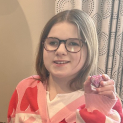Adoptive Cell Therapy Targeting Antigen Escape Variants in Childhood High Grade Glioma
Brain tumors are the most common solid tumors in children. High Grade Gliomas (HGG) constitute nearly 20% of all childhood brain tumors. These tumors are particularly difficult to treat and usually do not respond to even the most aggressive therapy, such that the expected survival seldom exceeds 24 months with less than 25% patients surviving 5 years from the diagnosis. It is therefore desirable to develop novel therapies that could improve these disappointing outcomes. Immune system based therapies have the potential to fulfill this dire need. We propose to generate immune cells (T-cells) from HGG patients to render them specific for two proteins, HER2 and IL-13Ra2, that are expressed in HGG tumor cell surface but on normal brain tissue. Expression of these surface proteins is variable from tumor to tumor and in fact, within a single tumor (e.g., some cells will be both HER2 and IL-13Ra2 positive while others may express either HER2 or IL-13Ra2 protein only). Killing tumor cells with T-cells specific for a single protein results in selective survival of tumor cells that do not express this protein. This leads to tumor recurrence after therapy. Hence we plan to target more than one protein simultaneously with the goal of decreasing the risk of tumor recurrence. We will genetically engineer T-cells to become both HER2 and IL-13Ra2-specific and test in the lab and in animal models, if this results in better tumor control over targeting one protein only. This proposal builds on the successful preclinical studies done at our institution [Ahmed et al. Can Res 2007 and Ahmed el al. Clin Can Res 2009] that are now translated into an FDA- and IRB-approved clinical trial (http://clinicaltrials.gov/ct2/show/NCT01109095) enrolling children with recurrent/ progressive Grade IV HGG (Glioblastoma). Knowledge gained from the current proposal will be used to justify and develop a clinical trial to treat patients with HGG. Furthermore, the obtained information could well have applicability for immunotherapy to other brain tumors and could conceptually impact other cancers outside the central nervous system.

